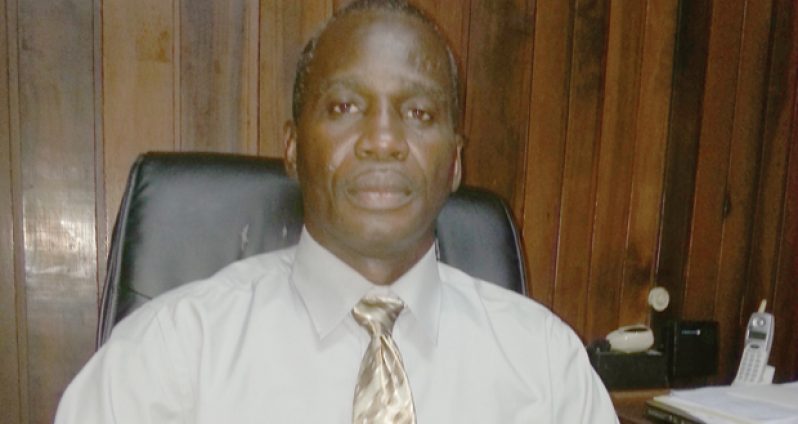–defends impartiality of police’s work
CRIME Chief, Mr. Leslie James yesterday told the Guyana Chronicle that the investigations “are ongoing” into the matter related to the controversial leak of a 19-minute recording of a private conversation.He also seized the opportunity to defend the impartiality of the investigations, following concerns to the contrary, making it clear that the work of the Guyana Police Force (GPF) is done in a professional manner.
‘No one shall be subjected to arbitrary interference with his privacy, family, home or correspondence…everyone has the right to the protection of the law against such interference or attacks’ — UN International Covenant on Civil and Political Rights
“It is the right of Kaieteur News, or anyone else, to express and opinion, but at the end of the day, the Police has to investigate, and has to do so professionally. That is what we are endeavouring to do; we cannot stop someone from expressing a view,” James said.
Publisher of the Kaieteur News, Mr. Glenn Lall last Monday filed a report with Deputy Commissioner of Police, Mr. Balram Persaud, after releasing the recording of a private conversation between Attorney-General (AG), Mr. Anil Nandlall and Kaieteur News’ senior reporter, Mr. Leonard Gildharie. Lall’s defence is that the contents of the recording indicate that his life, the lives of his family and staff members are under threat. The Guyana Chronicle has been given to understand that both Lall and Gildharie have since been questioned by the police.
Asked about the status of the interviews done to date, James said they will have to be carefully examined to determine the way forward.
LEGAL INFRACTIONS
Questions are still being asked about how Lall came to be in possession of the recording; and the feeling out there is that if Gildharie did not give it to him, then we could possibly be dealing with a legal infraction.
Questions are also being asked about the circumstances under which the telephone conversation was recorded; whether it was done by Gildharie, or by way of wiretapping, which latter modus could also constitute a legal infraction.
In the case of a possible wiretapping, the Interception of Communications Act, Chapter 47:03, Act No. 21 of 2008, which addresses the prohibition of interception (Section 3), states:
“3(1) Except as provided in this section, a person who intentionally intercepts a communication in the course of its transmission, by means of a telecommunication system, commits an offence, and is liable, on summary conviction, to a fine not exceeding five million dollars ($5,000,000), and to imprisonment for a term not exceeding three years.
“(2) A person does not commit an offence under this section if:
“(a) the communication is intercepted in obedience to a warrant issued by a Judge, under Section 6;
“(b) the communication is not intercepted in obedience to a warrant issued by a Judge, but on the authority of a designated officer in the case of a national emergency, or in responding to a case where approval for a warrant is impracticable, having regard to the urgency of the case.
“(3) The Court by which a person is convicted of an offence under this section may order that any device used to intercept a communication in the commission of the offence, shall be forfeited and disposed of as the Court thinks fit.
“(4) For the purpose of subsection (1), a communication shall be taken to be in the course of transmission by means of a telecommunications system at any time when the system, by means of which the communication is being or has been transmitted, is used for storing the communication in a manner that enables the intended recipient to collect it, or otherwise have access to it.”
If there were breaches of this law, the Kaieteur News’ publisher could be looking at a fine of up to $5M or a jail term of up to three years.
UN STIPULATIONS
Since last Monday, the privacy worries of officials, as well as private citizens, have been even more widespread.
In some quarters, concerned Guyanese are calling on the government to take up the matter with the United Nations, based on the stipulations included in international law, and Guyana’s treaty obligations.
Firstly, the United Nation’s (UN) Universal Declaration Of Human Rights, which is applicable to all Member States, makes it clear, in Article 12, that: “No one shall be subjected to arbitrary interference with his privacy, family, home or correspondence, nor to attacks upon his honour and reputation. Everyone has the right to the protection of the law against such interference or attacks.”
Secondly, the UN’s International Covenant on Civil and Political Rights, which was ratified by Guyana in 1977, in Article 17, reiterates the same message.
Thirdly, last December, the UN General Assembly, of which Guyana is a party, unanimously voted to adopt a resolution calling for online privacy to be recognised as a human right – ‘The Right to Privacy in the Digital Age’. For the first time, the General Assembly established that human rights should be applicable both offline and online. The resolution has been introduced by Germany and Brazil after the revelations of the extraterritorial extension of US surveillance in cyberspace. The resolution calls upon the 193 UN member states to “respect and protect the right to privacy, including in the context of digital communication” and “to review their procedures, practices and legislation on the surveillance of communications, their interception and collection of personal data, including mass surveillance.”
Additionally, Guyana’s Constitution, Article 154 (A), makes it clear that local functionaries in the judicial system, including judges, are required to take into account international law and Guyana’s treaty obligations in their deliberations. Article 154 (A) addresses the protection of human rights.





.jpg)








